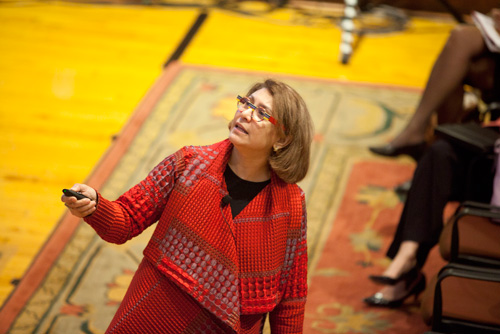
Mahzarin Banaji, Richard Clarke Cabot Professor of Social Ethics in the Department of Psychology, delivered the final Diversity Dialogue of the academic year titled “Blindspot: The Hidden Biases of Good People” at the Barker Center.
Kris Snibbe/Harvard Staff Photographer
Seeing again, for the first time
In Diversity Dialogue, Banaji discusses our ‘blindspots’
Managers sometimes have blind spots for biases that prevent them from hiring and retaining the best talent, said Mahzarin Banaji, Richard Clarke Cabot Professor of Social Ethics in the Department of Psychology and senior adviser to the FAS dean on faculty development, in a recent presentation, “Blindspot: The Hidden Biases of Good People,” at the Barker Center.
“Liking people who are different is an acquired taste. Like the first time you eat sushi, it takes getting used to,” Banaji said.
The event was the third and final Faculty of Arts and Sciences Diversity Dialogue for the academic year.
Structuring job interviews in a way that is not biased is almost impossible, Banaji said.
“We think we are fair and consistent, but we are not,” Banaji said.

When the conversation turned to questions of racial discrimination, Banaji drew an important distinction. “The word racist,” she said, “should be used for conscious bias, not for unconscious bias.” But, she warned, the latter can do just as much, if not more, harm.
Seeking solutions to bias makes good legal sense and is good business practice, Banaji said. And, she said, “When a group is not diverse, it can’t be as good as it might be.”
“Blindspot” was the final of three FAS Diversity Dialogues for this academic year. The series began last October with “Microinequities: The Power of Small,” presented by Stephen Young of Insight Education Systems. “Inclusive Leadership: Managing Successful Teams” by Connie Wong of CWS Associates was presented in December. FAS Human Resources is planning a new series of Diversity Dialogues for next academic year. Stay tuned.




